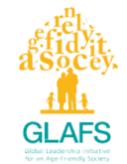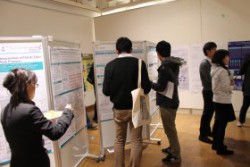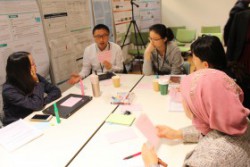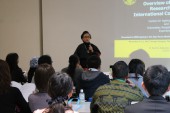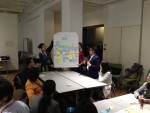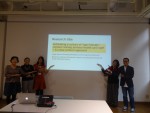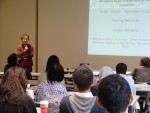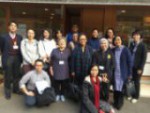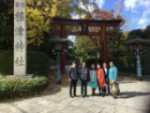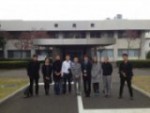「APRU Ageing in the Asia-Pacific Workshop 2017 for Junior Gerontologists」レポート
APRU Ageing in the Asia-Pacific Workshop 2017 for Junior Gerontologistsレポート |
|
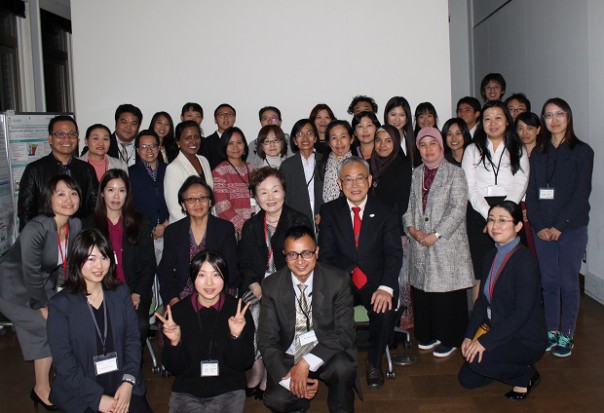 |
|
| APRU Population Ageing(環太平洋大学協会・高齢社会部門)が定期的に開催している若手研究者向けのワークショップが、2017年11月9日から11日の3日間にわたって東京大学本郷キャンパスで開催されました。 このワークショップはIOGと一般社団法人高齢社会共創センターが共催し、日本を含む9か国から正式な参加者21名および、APRU参加大学である慶應義塾大学の大学院生5名、GLAFSの大学院生39名が講演やポスターセッション等に参加しました。アジア各国の参加者の旅費援助については国際交流基金アジア・文化創造協働助成プログラムからご支援をいただきました。この場を借りて御礼申し上げます。詳細なプログラムはこちらをご覧ください。 |
|
| ワークショップ1日目は午前に講演会が行われ、初めにWHO神戸センター、テクニカルオフィサーのローゼンバーグ恵美氏による、「Measuring and Evaluating Age-Friendly Cities and Communities」と題した講義で、WHOが考案したAge-friendly(高齢者に優しい)コミュニティの評価方法と街づくりの実践について具体的な事例が紹介されました。アジアン・エイジング・ビジネスセンター理事長の小川全夫氏は「Recommendation of Action Research for Promoting Age-Friendly Communities」と題した講義で、アクションリサーチの実際の取り組み例を紹介しました。昼食時は、立食形式で昼食をとりながらワークショップ参加者によるポスター発表が行われ、多岐にわたる分野の研究について意見交換がなされました。 午後は小川全夫氏が紹介した手法の一つである「おたがいさまワークショップ」を参加者が体験しました。ワークショップは「おたがいさまワークショップ」を様々なコミュニティで実際に導入してきたNPO法人ドネルモの山内泰氏が司会し、九州経済産業局の南慎太郎氏、原口尚子氏、アジアン・エイジング・ビジネスセンターの佐々木喜美代氏、湯浅玲子氏が各グループを回ってディスカッションを盛り上げてくださいました。様々な立場の当事者(ステークホルダー)が共通のコミュニティについて語り合うことの意義を体験し、自分の所属するコミュニティや社会への適用可能性について議論しました。夜にはウェルカムディナーが開催され、リラックスした雰囲気の中、自己紹介が行われ、自分の研究分野や出身国について自由に語り合う場となりました。 |
|
| 2日目の午前は、9年前に東京大学で開催されたIOG主催のAPRUワークショップに参加し、その後インドネシアの高齢社会研究の第一人者となったTri Budi Rahardjo教授によるインドネシアの老年学を俯瞰した講義の後、シンガポール(Ad Maulod氏)、タイ(Thanakamon Leesri氏)、日本(駒沢行賓氏)の参加者から自身の研究について口頭発表が行われ、アジアにおける老年学研究の共通点や違いについて議論されました。その後、今後アジアで研究されるべき老年学のテーマについてグループに分かれて議論を行い、午後には主要な4つのテーマに分かれて実践的な議論が行われました。4つのテーマは①高齢者の金融リテラシー、②高齢者に優しい文化、③認知症に優しいコミュニティ、④高齢者の社会参加で、おおよそ1年から2年間で発表を行うことを目標とした研究計画が練られました。
Tri Budi Rahardjo教授の講演内容はこちら |
|
最終日には、2日目に議論された研究計画がグループごとに発表されました。どのグループも3~4か国の参加者を含み、国際的な研究の枠組みが考案されました。各グループの研究タイトルは下記のとおりです。
(高齢者のエンパワメントとしての金融リテラシー 健康管理や晩年の人生の選択肢を広げる5つの都市の比較研究)
(介護従事者に「高齢者に優しい」文化を広める比較文化的アプローチ)
(アジア各国における認知症に優しいコミュニティの比較文化研究)
(社会参加と幸福―日常生活に不自由のある高齢者の文化比較) *発表資料の無断転載はご遠慮ください |
|
| その他のワークショップの写真はこちらから。 |
参加したコース生の感想
駒沢行賓 工学系研究科都市工学専攻 博士課程1年 |
|
| 多様なステークホルダーを巻き込み、’Science for society’の言葉の下で課題解決に臨む姿勢は、勿論できることは限られますが、一学生として学ぶところが多かったと解しています。また、WSや発表を通じ、各国、社会経済的状況が異なる中、アジア諸国からの参加者が、お互いの活動や知見を共有していく過程に、やや大げさですが、欧州でも米州でもない、アジアとしてのモデルを創り上げて行ける可能性を感じました。個人的には、同じ問題意識を持つ方とお話しができたほか、自分に足りないこと、頑張って追いつかなければならないところが見え、これを’収穫’としたいと考えます。いずれにしましても、貴重な経験をいただき、ありがとうございました。 | |
スタッヴォラヴット・アンヤポーン 医学系研究科生殖・発達・加齢医学専攻 医学博士課程2年 |
|
| 11月11日 環太平洋大学協会(Association of Pacific Rim Universities、略称APRU)の研究者が新宿区の暮らしの保健室、坂町ミモザの家とマギーズ東京の見学にいらっしゃいました。暮らしの保健室で秋山正子先生がそのプロジェクトのきっかけとシステム等について説明した後、スタッフから坂町ミモザの家を案内していただきました。暮らしの保健室は予約なしに医療や介護、健康などの相談が無料でできます。坂町ミモザの家は小規模多機能型居宅介護として高齢者が地域の中で暮らし続けることを支えます。また、がんのサポートセンターのマギーズ東京を視察しました。がんになった人とその家族 が、気軽に訪れて、安心して相談したり、自分の力をとりもどせるサポートがあるセンターです。最後に、スタッフやAPRUの研究者共に、 熱心な意見交換を行いました。その三つの施設は今の社会に必要な力だと感じました。 | |
横内陳正 医学系研究科健康科学・看護学専攻 博士課程2年 |
|
| 当日は,プログラムを終えた程良い解放感の下で,また,天気にも恵まれて,和気あいあいとした散策となりました。本郷キャンパスを出発し,根津,千駄木,谷中にかけて,公的施設,神社,商店街などを巡りながら,学生スタッフや教職員がそれぞれの知識を出し合って,参加学生に解説をしながら歩きました。学生スタッフ同士も,お互いの知識から新しいことを学び,また,参加者からの問いかけを通して,普段とは異なる視点で,地域のことや,地域の高齢者の方の生活を振り返る良いきっかけにもなりました。 | |
吉崎れいな 工学系研究科機械工学専攻 修士課程1年 |
|
| 国立障害者リハビリテーションセンター(以下,国リハ)へ見学に伺いました。国リハの大きな役割である,JIS規格に則った試験評価のための機器や,体温調整機能の搭載を試みる車椅子など試作品を見せていただきました。また,認知症のある人の福祉機器展示館では,認知症の方向けのコミュニケーションロボットや回想による想起を促すツール,薬の飲み忘れを防ぐ機器,認知を助けるトイレなど,生活の場における様々な支援機器を見学,体験いたしました。見学者の方々は,コミュニケーションロボットの倫理的問題や,日本の介護など諸制度をはじめ,積極的な質問と活発な議論がなされました。 | |
“APRU Ageing in the Asia-Pacific Workshop 2017 for Junior Gerontologists” report |
|
 |
|
| A workshop regularly held by APRU Population Ageing was held from November 9, 2017 to November 11, 2017 at the University of Tokyo, Hongo campus. This workshop was hosted by the Institute of Gerontology and Co-Creation Center for Active Aging, and received 21 participants from 9 countries (including Japan). Five graduate students from Keio University and 39 graduate students from the Global Leadership Initiative for an Age-Friendly Society (GLAFS, Institute of Gerontology) attended parts of the workshop such as the poster session. We would like to thank Japan Foundation Asia Group for supporting travel expenses for some of the participants from Asian countries.The detailed program of the event can be found here. | |
| Two key note lectures were presented on the first morning of the workshop. First, Dr. Megumi Rosenberg, Technical Officer of WHO Kobe center presented a lecture on “Measuring and Evaluating Age-Friendly Cities and Communities” and introduced the Evaluation methods for Age-friendly cities designed by WHO, and actual examples of such cities. Dr. Takeo Ogawa, President of the Asian Aging Business Center gave a lecture on “Recommendation of Action Research for Promoting Age-Friendly Communities” and showed examples of Action Research projects. A poster session was held over a lunch buffet. Participants who came from diverse backgrounds presented their research and discussed their topics of interest.
Dr. Megumi Rosemberg’s lecture can be found here |
|
| In the afternoon, participants took part in a simulation of the “Otagaisama Workshop,” a method introduced by Dr. Ogawa in his lectures. Mr. Yutaka Yamauchi from NPO donner le mot facilitated the workshop, and Mr. Minami Sintaro and Ms. Naoko Haraguchi from Kyushu Economic Research Center, and Ms. Kimiyo Sasaki and Ms. Reiko Yuasa from Asian Aging Business Center helped the groups start discussion. The participants experienced the importance of different stakeholders sharing opinions about their community, and discussed how this method can be applied to their community. The day ended with a welcome dinner where participants relaxed and networked.
Professor Tri Budi Rahardjo’s lecture can be found here |
|
| The four projects were presented on the final day. Each group had participants from 3 to 4 countries and all research projects were international. The title of each group is as follows.
*Copyright of the presentations are held by the authors. Unauthorized |
|
| More photos can be found here. |
Comments from GLAFS students who participated in the workshop:
Yukitsugu Komazawa, Engineering Department, D1 |
|
| In the last closing remarks, we heard the words, ‘Science for society’, which means, in my understanding, all of us are responsible for improving the society as much as we can. Although the countries the participants came from were different from each other, I felt some possibility for co-building the unique Asian models under the basic attitudes the teachers and presenters mentioned. Personally, thanks to other splendid participants, I found my weaknesses which I have to overcome, and this has motivated me more. Without this program and the participants, I wouldn’t have recognized these important things. So, I really appreciate it. And, I hope we will some time talk about the future vision with each other. | |
Suthutvoravut Unyaporn, Medical Department MD2 |
|
| On November 11th, participants of Association of Pacific Rim Universities (APRU) workshop visited Kurashi-no-hokenshitsu(Life Classroom), Mimoza house and Maggie’s Tokyo. We were kindly provided information about the project by Dr.Masako Akiyama who is the head of the centers and after that the staff guided us around the Life classroom and Mimoza house. Life Classroom is a community-based counselling center for lifestyle, health, medical treatment and nursing care. Mimoza House is a small-scale multifunctional in-home nursing care which helps elderly people to continue living in their own community. Also, we visited Maggie’s Tokyo which is the cancer support center. The center provides counselling and support for cancer patients and their families to help them feel relaxed and retain their self-esteem. Lastly, we exchanged interesting opinions between the staffs and researchers from different countries. As we have seen these 3 centers, we felt that they are essential support for today’s society. | |
Nobutada Yokouchi, Medical Department D2 |
|
| It was an ideal weather for an outing on that day. We started from Hongo campus and on our way through Nezu, Sendagi, and Yanaka, we visited Nezu community center, Nezu shrine, and Yanaka ginza shopping street. The visit to Nezu shrine was especially exciting for the participants, because we had our Japanese tradition of Shichi Go San on that day. Each of us from Todai contributed to explaining the facilities and traditions to the participants. We also learned new perspectives through participants’ questioning which were simple yet essential. | |
Reina Yoshizaki, Engineering Department M1 |
|
| I joined the tour to the National Rehabilitation Center for Persons with Disabilities. We were shown equipments for evaluation of products for their compliance with Japanese Industrial Standards(JIS), which is one of the major roles of the Rehab center, and a test model of wheel chairs with function to control body temperature of the person who rides it. In the care equipment exhibits, we saw and tested life support technology such as communication robots, tools that help memory recall, equipment that avoids skipping pills, and toilets which supports dementia patients. Participants had a lively discussion on the moral issues of communication robots, and care system in Japan during the Q&A session. | |
